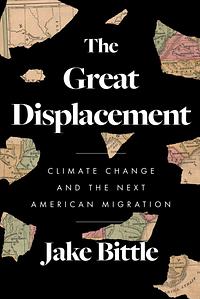Take a photo of a barcode or cover
challenging
emotional
informative
reflective
sad
slow-paced
informative
informative
medium-paced
This hit on another level as climate change was a factor in my own decision to immigrate to Scotland from the US. I also used to work in the mortgage industry and have been worried specifically about the sustainability of flood insurance for years now. Bittle’s description of the housing market as a stick of dynamite being passed from homeowner to homeowner really struck a chord. I think this is a really important read and Bittle writes in a gripping and engaging manner.
challenging
informative
medium-paced
This is a must read for anyone concerned with climate change, or working in housing, energy, government policy, or social services
challenging
dark
informative
medium-paced
This book filled me with so much rage. And fueled my contempt for:
✅ The army corps of engineers
✅ Insurance companies
✅ Developers
✅ Rich people
✅ The army corps of engineers
✅ Insurance companies
✅ Developers
✅ Rich people
This one’s hard to rate. On the one hand, one chapter got me in my feels on my morning commute. How dare. On the other hand, it just wasn’t quite the balance of storytelling and analysis that I was looking for.
Too sad once the guy accidentally ran over his dog
challenging
emotional
informative
sad
tense
medium-paced
This is one of those books that has a perfect title; however, it left me wanting more.
I went into this book thinking it'd be a capitalism critique in the realm of climate change and how that will facilitate climate displacement. I was shocked to find out 1) it was more narratively formatted following personal stories before zooming out onto each specific climate struggle and 2) that it was a very soft capitalist critique.
I'll start with the good. The narrative style and deep dive into personal stories to explain how different regions are experiencing the effects of climate change and climate displacement differently on the micro level but very much the same on a macro level was done incredibly effectively. It was done so effectively; I had to stop listening to the audiobook on my way to work because it would wreck my mood for the rest of the day. Bittle does a great job sharing personal stories that are anecdotal but reflective of the larger picture and often weaving multiple stories into a properly fleshed out complex issue. The section about managed retreat -- the concept of planned relocation from an area deemed unsustainable due to increased environmental danger due to climate change-- has stuck with me. Bittle tells us that managed retreat is actually *not* a popular option, but regardless of if it's managed or not, retreat will be necessary.
Even though Bittle gives us a detailed view, his critique and solutions are pretty passive. Bittle includes a lot about how private entities (developers, insurance companies, fossil fuel industry, etc.) and our government are all responsible for allowing things to get this bad and how they continue to let them get worse. At the end, he even addresses how hyper-individualism and no right to shelter in the US has already contributed to climate displacement. My reading is that he is critical of all the things that make up capitalism but isn't critical of capitalism itself. I spent the whole time excited to hear about what a centrally planned economic model could do to combat the climate catastrophe and where we've seen an economic model like that succeed, but that never happens.
Similarly, Bittle paints a clear picture, with every example, that our world has changed irreversibly. Our approach to doing things the same way is what landed us here and our adherence to that is what continues to fail people in climate risk areas. Yet, his solutions are all based on the system we currently operate under that haven't changed for decades. It's based around electoral politics and policy reform. In short, it's an optimistic SocDem approach to something that requires a break in the status quo.
The last thing that rubbed me the wrong way was a colonial framing. Like his passive critiques of capitalism, Bittle includes indigenous groups in the story as a beginning point or another group effected but doesn't address how the colonial approach to the treatment of land is what hyper accelerated the issues we face today. I wanted there to be more focus on how intentional indigenous people’s relationship with land was versus how transactional we have treated this land since colonization. There was one instance of a native tribe being a key player in a chapter about water access in Arizona. Even then, Bittle frames their prosperity as having access to a lot of water, which is true, but once again glosses over the fundamental difference in their relationship between people and land.
All in all, I would recommend this book for folks wanting to understand how the climate disaster will likely play out. There is something to be said about knowing the landscape and I think Bittle does a fantastic job with that. In terms of a book detailing how to mitigate the impending climate displacement/migration/catastrophe/disaster/whatever you want to call it; you will be frustrated reading this.
I went into this book thinking it'd be a capitalism critique in the realm of climate change and how that will facilitate climate displacement. I was shocked to find out 1) it was more narratively formatted following personal stories before zooming out onto each specific climate struggle and 2) that it was a very soft capitalist critique.
Even though Bittle gives us a detailed view, his critique and solutions are pretty passive. Bittle includes a lot about how private entities (developers, insurance companies, fossil fuel industry, etc.) and our government are all responsible for allowing things to get this bad and how they continue to let them get worse. At the end, he even addresses how hyper-individualism and no right to shelter in the US has already contributed to climate displacement. My reading is that he is critical of all the things that make up capitalism but isn't critical of capitalism itself. I spent the whole time excited to hear about what a centrally planned economic model could do to combat the climate catastrophe and where we've seen an economic model like that succeed, but that never happens.
Similarly, Bittle paints a clear picture, with every example, that our world has changed irreversibly. Our approach to doing things the same way is what landed us here and our adherence to that is what continues to fail people in climate risk areas. Yet, his solutions are all based on the system we currently operate under that haven't changed for decades. It's based around electoral politics and policy reform. In short, it's an optimistic SocDem approach to something that requires a break in the status quo.
The last thing that rubbed me the wrong way was a colonial framing. Like his passive critiques of capitalism, Bittle includes indigenous groups in the story as a beginning point or another group effected but doesn't address how the colonial approach to the treatment of land is what hyper accelerated the issues we face today. I wanted there to be more focus on how intentional indigenous people’s relationship with land was versus how transactional we have treated this land since colonization. There was one instance of a native tribe being a key player in a chapter about water access in Arizona. Even then, Bittle frames their prosperity as having access to a lot of water, which is true, but once again glosses over the fundamental difference in their relationship between people and land.
All in all, I would recommend this book for folks wanting to understand how the climate disaster will likely play out. There is something to be said about knowing the landscape and I think Bittle does a fantastic job with that. In terms of a book detailing how to mitigate the impending climate displacement/migration/catastrophe/disaster/whatever you want to call it; you will be frustrated reading this.
fast-paced
need everyone to read this book, especially people who keep saying climate change will become a problem 'eventually' because it is already an issue everywhere and it will get worse, which means action needs to be taken now. and the stories of real people with names helped me as a reader to feel more connected. reading this after extreme floods in the counrty i live last year made this so much more real.








